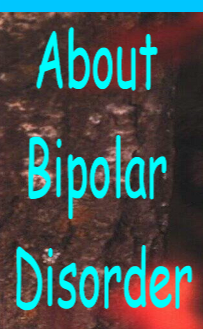Bipolar disorder is a brain disorder that causes unusual shifts In moods, energy and ability to function. These mood swings can cause a lot of stress and turmoil in the lives of the afflicted and those who are in their lives. Many times they have damaged relationships, poor performance in school or their job, and may attempt suicide.
About 2 million ( or 1%) of the American population is afflicted with Bipolar disorder in any given year. The illness typically presents itself during Teen or young adult years. However some start to have symptoms as early as infancy or late into their adult lives.
The Symptom that best describes a bipolar is a dramatic swing in their mood. Some times overly high sometimes irritable ( mania) to sad/hopeless ( depression) with normal moods in between .
Mania:
Increased Energy, activity, restlessness
Excessively High, overly good, euphoric mood
Extreme irritability
Racing Thoughts- fast talking, idea jumping
Distractible, cant concentrate
Little need for sleep
Unrealistic Beliefs in ability or powers
Poor Judgment
Spending sprees
Lasting Behavior different than usual
Increased sex drive
Drug and alcohol abuse ( self medication)
Provocative, intrusive, or aggressive behavior
Denial of anything wrong
Manic episode = elevated mood, 3+ symptoms most of the day every day for at least 1 week. If Mood is irritable it is 4+ symptoms
Depression:
Lasting sad, anxious, empty mood
Hopelessness, pessimism
Guilt, worthlessness, helplessness
Loss of pleasure in activities that they usually enjoy and sex
Decreased energy, fatigue, slowed down
Difficulty concentrating, remembering, Making decisions
Restlessness or irritability
Too much sleep, cant sleep
Change in appetite, weight changes +/-
Chronic Pain and persistent body problems not associated with injury
Thoughts of death , suicide, attempted suicide
Depressive episode = 5+ symptoms last most of the day for 2 weeks or longer
Shortened versions of the Mania and depressions are called Hypomainia and dysthmia
Severe mania or depression can have symptoms of psychosis
Common symptoms of Psychosis:
Hallucinations ( seeing and/ or hearing things that arent there)
Delusions ( false strong beliefs not influenced by logic or explained by persons usual cultural concepts)
Reflects extreme mood state
Symptoms of mania and depression can occur together = mixed bipolar state
Agitation
Trouble sleeping
Change in appetite
Psychosis
Suicidal thoughts
Course of illness
Approx 1/3 have residual symptoms. Small % of afflicted persons experience chronic unremitting symptoms
Classic Form:
Reoccurrent mania / depression = Bipolar disorder I
May never reach full mania but goes into hypomania / depression + bipolar II
When 4 or more episode occur within 12 months it is referred to as rapid cycling. Some people can experience multiple mood swings within one week or even one day. Rapid cycling is more common in women than in men.
With out proper treatment the illness tends to worsen with time .
Childhood
Children can also be bipolar. The children most likely would be those with a Bipolar parent(s). Children have a tendency to rapid cycle daily and be more irritable with more temper tantrums
Cause:
Most scientists believe there is no single cause for Bipolar disorder. They seem to feel that there are many contributing factors to the illness. Researchers are searching for the specific gene(s) that cause the illness but they have found in identical twins ( who have the exact same genes), one may develop the disease while the other does not. It does appear that the cause cold be genes mixed with other factors.
Medications:
There is no one medication that has been found to be good for treating all bipolars. Many need a cocktail of medications to help control their symptoms some of the medications they have found to help the symptoms of the disorder are
Lithium
Anti - convulsents
Atypical anti-psychotics
Benzodiazepine can be used for sleep problems
Researchers have also found that Bipolar Disorder and Thyroid Gland function go hand in hand. Many bipolars have problems with their Thyroid and need medications and/or surgery.
Researchers are also looking into omega 3 fatty acids as a possible way to help bipolar symptoms
This information was researched at the website of :
The National Institute of Mental Health

